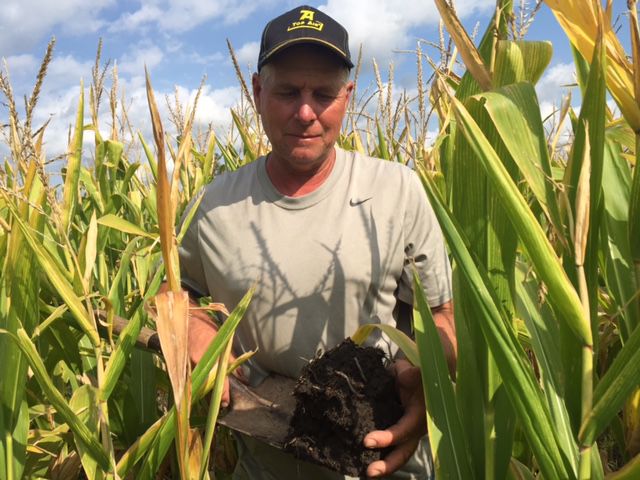“Trial by error” and “learning everything the hard way” are clichés that are common lingo of farmers and ranchers.
Shane New, 50, Holton, Kansas, has farmed for more than 25 years in Jackson County. When he was younger his income was derived from a commercial seeding operation and his work was often found along highway projects to reduce erosion.
“I had the income to support my habit of farming,” he quipped as he sought to improve his farm’s finances.
He credits his wife, Kelli, a Maryland native, and radio talk show-financial guru and author Dave Ramsey for providing Shane with sound advice. His wife, a nurse, and Ramsey re-enforced the need for realistic budgets and to better understand his operation’s efficiency.
“My household finances were never an issue,” Shane New said. “The farm was always the problem. I was constantly trying to convince my wife why I needed to keep the farm going.”
Shane understood that for him to become a more efficient operator he needed to read and study what he was doing.
“It got me started on soil health,” he said. “We had developed a soil plan and I had a no-till drills from the commercial seeding operation.”
He started to connect the dots on what he thought needed to be done. The soil nutrients were there; he just needed the biology to bring it back. New’s focus changed to having proper water infiltration and building soil health.
Through his research and asking key people, he changed his mindset.
“It is continuing to evolve,” he said about learning from Kris Nichols, a renowned soil scientist, who said, “Iron does not build carbon.”
In recent years he has investigated how he could improve water infiltration. He believes that every square foot in a field can be improved and is willing to go to the lengths to prove his point.
What New has found interesting about soil health studies is there is no stopping point and how interwoven the principles of soil health are to his operation. The five principles are soil cover, minimizing soil disturbance, plant diversity, continually living plant roots and livestock integration.
“We always talk about the five principles and I used to think if I do three out five or four out of five was good enough but I realized you have to do all five to make it work.”
Even for a farmer in eastern Kansas, where moisture is plentiful most years, there are surprises when major downpours change his mindset. It happened to New in the drought of 2012 and 2015. In particular, he remembers 2015 when 20 inches of rain fell on his farm in the spring. He thought he was going to have a record triticale crop and do the same with no-till soybeans. Instead it was a water infiltration and percolation disaster. There were no soybeans to cut.
“From an economic standpoint it was devastating and that’s when I decided I had to do all five,” he said.
New will speak at Soil Health U and Trade Show, Jan. 23 to 24, 2019, at the Tony’s Pizza Event Center in Salina, Kansas. He plans to talk about how it takes a crisis to stimulate a feeling to create change, learning and a course of action. Agriculture has successfully used tools the past 10,000 years to increase food production but he cautions that all tools inhibit soil fertility and water infiltration.
“Nothing will change unless you face a crisis,” such as what he found in 2015. “Until then we only thought we were successful.”
He is also eager to attend events that help him learn. Keynote speakers like Gabe Brown bring a wealth of experience and will share their challenges, hopes and opportunities. New is also interested in learning and asking questions to those who attend the event. He is also a part of Soil Health Consultants LLC.
He believes producers play an important part in improving the earth’s health.
“We cannot delay making our ecosystem better,” he said.
Dave Bergmeier can be reached at 620-227-1822 or [email protected].




